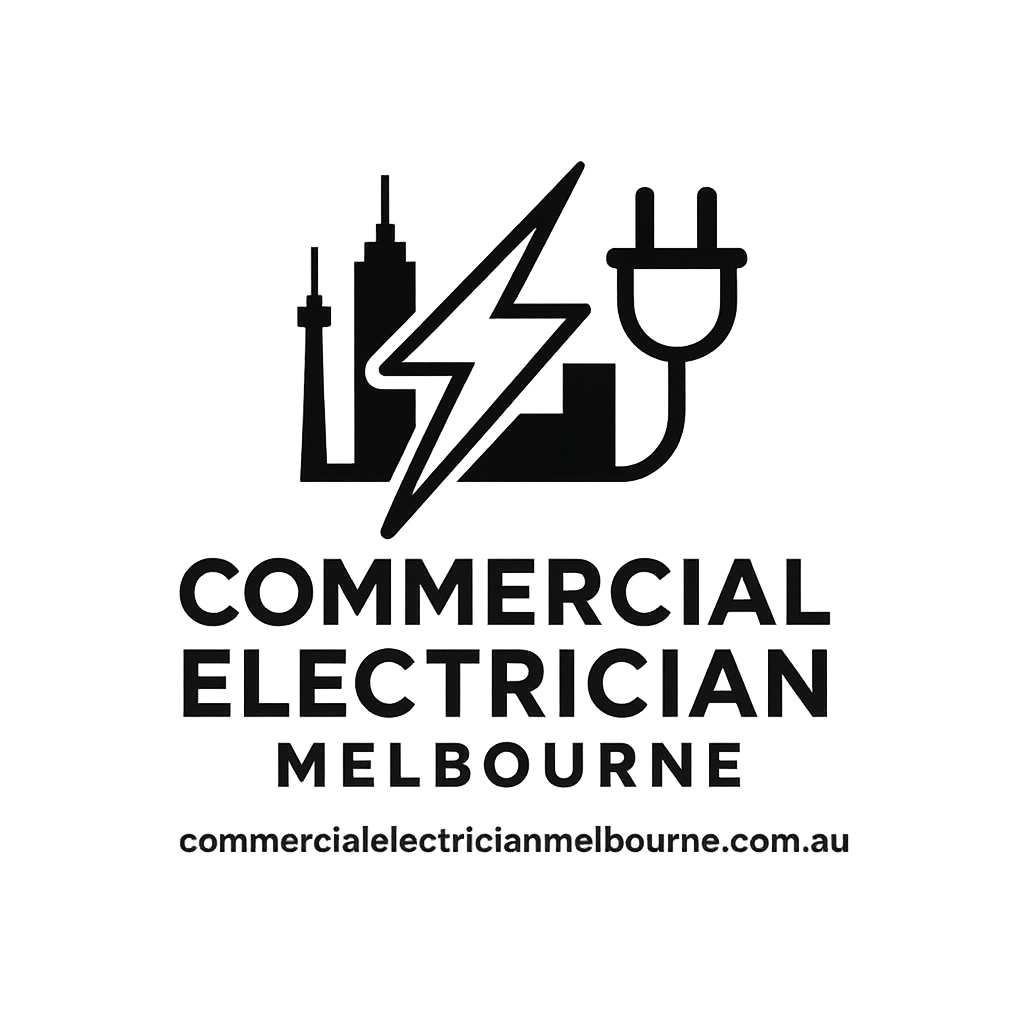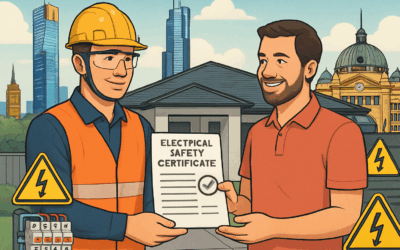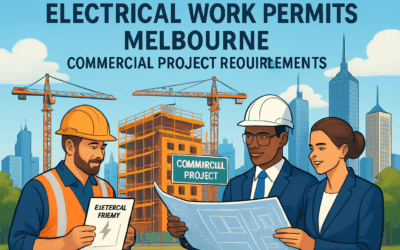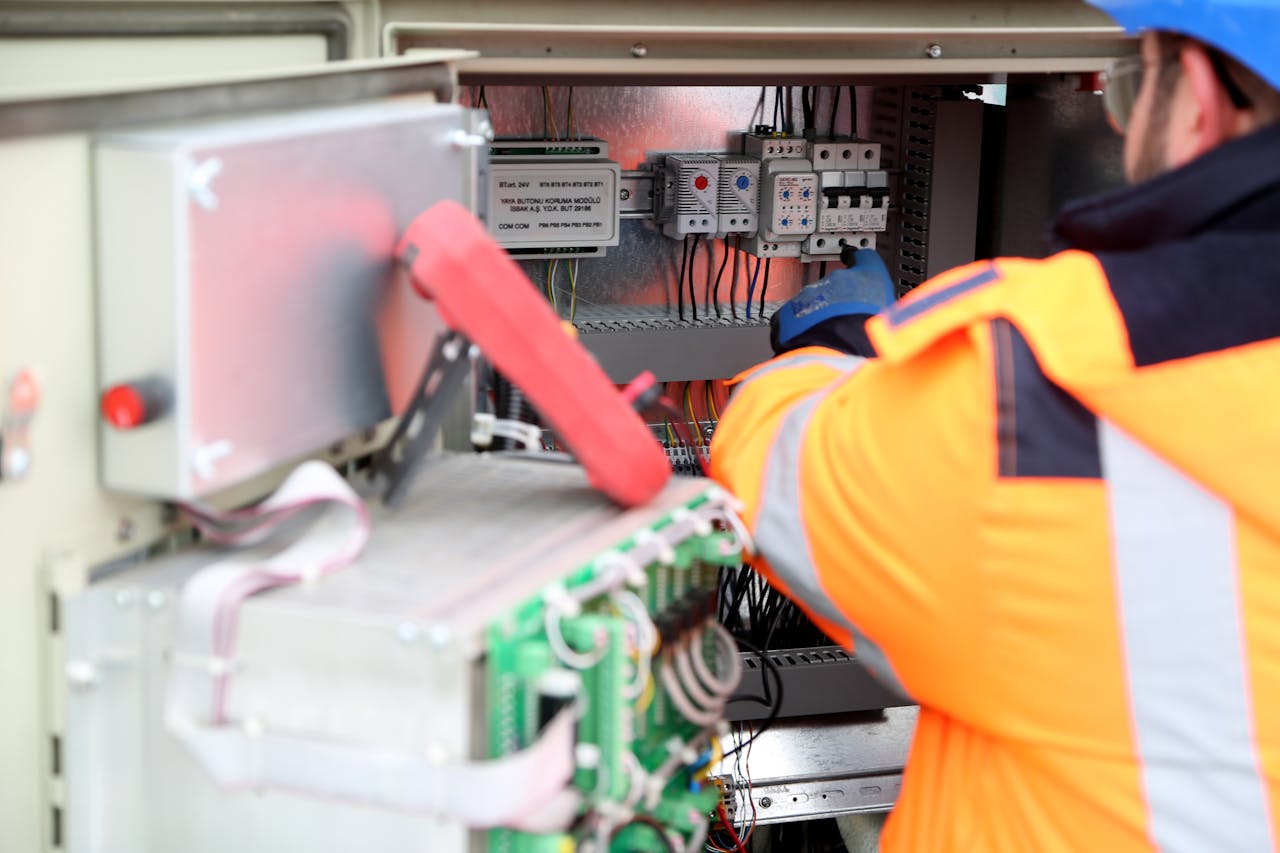Welcome to your one-stop guide on smart HVAC electrical controls in Melbourne—a topic that’s crucial for any small business owner involved in commercial property management. As modern business operators, you’re always on the lookout for ways to boost efficiency, cut down on operational costs, and improve overall sustainability. With energy prices on the rise and a growing emphasis on environmental responsibility, now is the perfect time to consider upgrading your HVAC systems to smart solutions that promise energy savings and streamlined management.
In this comprehensive guide, we’ll break down the ins and outs of smart HVAC controls, dive deep into local best practices and regulations in Melbourne, and share practical tips on finding the right commercial electrician. Whether you’re looking to retrofit your current system or planning a new build, this article will equip you with the knowledge you need to make the best decision for your business.
Introduction: Why Smart HVAC Controls Matter for Your Business
Small businesses in Melbourne often face tight budget constraints and are constantly seeking ways to reduce energy costs. With HVAC systems typically accounting for a significant portion of your energy usage and maintenance expenses, investing in smart HVAC controls isn’t just an upgrade—it’s a necessity. Not only does smart HVAC technology help monitor and manage energy consumption, but it also ensures better comfort levels for employees and customers alike.
Smart HVAC systems in a commercial setting enable you to:
- Monitor temperature and humidity levels remotely.
- Optimize energy usage, reducing waste.
- Automate heating, ventilation, and air conditioning processes.
- Improve overall building management through integration with other smart building technologies.
- Comply with local energy efficiency codes and regulations in Melbourne.
For business owners, understanding how these systems work and how to properly implement them can result in noticeable energy savings and improved operational efficiencies. Let’s dive in and explore what smart HVAC controls are, their features and benefits, and how to choose and prepare for an upgrade.
What Are Smart HVAC Controls?
Smart HVAC controls refer to advanced systems that integrate technological solutions like IoT sensors, programmable thermostats, and remote monitoring capabilities to efficiently manage the heating, ventilation, and air conditioning in a building. These systems often connect to your building management systems (BMS) for seamless integration with other energy-saving technologies.
Key Components of Smart HVAC Systems
- Smart Thermostats: These devices adjust the temperature settings based on occupancy, weather forecasts, and pre-set preferences, ensuring consistency and energy conservation. In Melbourne, smart HVAC thermostats are becoming a standard in commercial settings.
- Building Management Systems (BMS): These systems act as the central platform to control and monitor various building services, including HVAC. Whether it’s lighting, security, or climate control, a BMS ensures that everything runs smoothly.
- IoT Sensors: Connected sensors measure environmental parameters and feed this real-time data to your HVAC control system. This allows for timely adjustments to the heating and cooling needs.
- Remote Monitoring Tools: With these, you can track energy performance and system alerts from anywhere, ensuring that any issues can be quickly addressed.
- Zone Control Systems: These allow you to divide your building into zones with separate controls tailored to the specific needs of each area, significantly improving efficiency.
By installing smart HVAC controls, you’re not just investing in a piece of technology; you’re stepping into a new era of building management that leverages automation, analytics, and remote monitoring to create an efficient, comfortable, and cost-effective environment.
How Smart HVAC Controls Work
Smart HVAC controls operate on the principle of continuous monitoring and automated decision-making. Here’s a simplified process breakdown:
- Data Collection: IoT sensors and other integrated devices collect data—including temperature, humidity, occupancy, and even light levels—from various parts of the building.
- Data Analysis: The central system, often a BMS, analyzes the data in real time. The system uses algorithms to determine if the current environmental conditions meet the desired pre-set thresholds.
- Automated Adjustments: Based on the data analysis, the system automatically adjusts heating, cooling, and ventilation to optimize energy consumption. For example, if a section of your building is unoccupied, the system can lower the air conditioning output for that specific area.
- Remote Monitoring and Alerts: Business owners or facility managers receive notifications on their mobile devices or desktops if the system detects any anomalies or inefficiencies, ensuring prompt corrective action.
- Integration with Demand Response Programs: In some cases, smart HVAC systems can participate in demand response programs, where the building reduces its load during peak energy periods, leading to even further cost savings.
This level of automation and efficiency not only improves energy consumption but also extends the lifespan of your equipment by ensuring it runs only as much as needed.
Features and Benefits of Smart HVAC Controls
Understanding the features and benefits of smart HVAC controls can help you decide if this technology fits your commercial property’s needs. Below are some of the primary benefits:
1. Energy Efficiency and Cost Savings
- Reduced Energy Consumption: By automating the control of HVAC systems, businesses can achieve significant energy savings. Smart systems adjust the heating or cooling based on real-time occupancy data, meaning energy is only used when and where it’s needed.
- Lower Operational Costs: With reduced energy usage comes lower utility bills, which is particularly valuable for small businesses with tight budgets.
- Demand Response Participation: Some smart HVAC systems allow your building to participate in demand response programs, where you reduce energy use during peak times in exchange for incentives from the energy provider.
2. Improved Comfort and Productivity
- Maintained Temperature Consistency: Automated tuning of HVAC systems keeps your employees and customers comfortable, fostering a better work environment and enhancing overall productivity.
- Zonal Climate Control: The ability to set different temperatures for different zones means that each part of your business environment can be optimized separately, catering to varying needs across areas.
3. Enhanced Monitoring and Diagnostics
- Real-Time Alerts: Smart HVAC systems provide real-time notifications if abnormal conditions are detected—such as a failing compressor or blocked air filter—allowing for proactive maintenance.
- Data Analytics: Detailed analytics and performance metrics help identify energy consumption trends, enabling better decision-making regarding future operational changes.
4. Environmental and Regulatory Compliance
- Energy-Efficient Solutions: Upgrading to smart HVAC controls helps your building meet stricter environmental standards and energy efficiency codes set by local authorities in Melbourne.
- Sustainability Credentials: Demonstrating an eco-friendly approach can improve your business’s public image, attracting environmentally conscious customers and even government contracts in some cases.
5. Remote Operation and Integration
- Remote Access: Whether you’re in the office or away from the premises, remote access allows you to monitor and control your HVAC systems easily.
- Integration with Other Smart Technologies: Many smart HVAC systems integrate smoothly with building management systems, automated lighting, security systems, and more, creating an interconnected, intelligent building ecosystem.
Practical Tips for Implementing Smart HVAC Controls
Implementing smart HVAC controls in your commercial property might sound like a daunting task, but with careful preparation, the process can be straightforward. Here are some practical tips to help you get started:
1. Assess Your Current System
Before diving into a new installation, evaluate the existing HVAC system in your building:
- Identify areas of inefficiency or frequent maintenance issues.
- Determine which parts of your building are most affected by inconsistent temperature control or high energy consumption.
- Look at your current utility bills and energy usage reports to understand where savings could be achieved.
2. Set Clear Objectives
It’s essential to define what you want to achieve with your smart HVAC controls:
- Are you focused on reducing energy costs?
- Is improving overall comfort for your employees and customers your primary goal?
- Do you need enhanced remote monitoring for proactive maintenance?
Setting clear, measurable objectives will help guide your decisions and ensure you choose the right system for your specific needs.
3. Research Local Regulations and Codes
When dealing with electrical installations, especially with HVAC systems, it’s crucial to be aware of local regulations:
- Familiarize yourself with Melbourne’s building codes and energy efficiency standards.
- Make sure any upgrades or retrofits comply with guidelines laid out by local councils and utility companies.
- Consult with local experts to ensure that your new system will pass inspections and qualify for any available energy rebates or incentives.
4. Find a Qualified Commercial Electrician with HVAC Expertise
Selecting the right professional is critical to the success of your installation:
- Look for Experience: Seek commercial electricians with a proven track record in installing smart HVAC controls and building management systems. Ask for references or view case studies.
- Check Certifications: Ensure your electrician is fully licensed in Melbourne and understands the relevant local electrical codes and HVAC regulations. Certifications in energy management systems or IoT deployments can also be a plus.
- Request Quotes and Compare: Get multiple quotes, compare costs, and understand the scope of services provided. A detailed consultation can help you assess whether the electrician can manage both the electrical wiring and integration with digital control systems.
- Ask for Local Insight: Melbourne-based professionals will have insights into local challenges, such as typical building structures, climate nuances, and regulatory requirements, ensuring a smoother installation process.
5. Plan for Downtime and Contingencies
Upgrading your HVAC system can involve temporary downtime:
- Schedule the Installation During Off-Peak Hours: Consult with your electrician to determine the best times to carry out work that minimizes disruptions to your business operations.
- Have a Backup Plan: If possible, arrange for temporary heating or cooling solutions to ensure your staff remains comfortable during installation.
- Technical Support: Verify that your service provider offers ongoing support both during and after installation so that any issues can be quickly resolved.
6. Prepare Your Team
A successful transition to smart HVAC controls involves everyone on your team:
- Employee Training: Make sure that your facility management or operations team is trained on using the new system—especially the remote monitoring and control features.
- Clear Communication: Inform your employees about the benefits of the new system and explain how it will improve their everyday working environment.
- Feedback Channels: Set up a mechanism to gather feedback from employees about the new system, which can inform further adjustments or improvements in the future.
7. Evaluate and Monitor System Performance
After installation, it’s crucial to continuously evaluate the performance of your new smart HVAC controls:
- Regular Data Reviews: Use built-in analytics and monitoring tools to assess energy usage and system performance. This also aids in early detection of potential issues.
- Maintenance Schedules: Create a proactive maintenance schedule based on manufacturer recommendations and system performance data to ensure long-term efficiency.
- Adjust Parameters as Necessary: Fine-tune the system settings as per seasonal changes or shifts in occupancy. This flexibility is a core advantage of smart systems and can lead to ongoing savings.
Best Practices for Smart HVAC Control Installation in Melbourne
In Melbourne, local conditions, regulations, and the climate play significant roles in the optimal use of smart HVAC controls. Here are some best practices tailored to the region:
Research and Compliance with Local Energy Efficiency Standards
Melbourne has specific energy efficiency requirements that businesses must follow. When planning your system upgrade:
- Consult with the Victorian Building Authority or local council to familiarize yourself with the latest updates in building standards.
- Ensure that any new systems meet the energy performance standards stipulated under local legislation. Compliance not only avoids fines but can also improve your building’s market value.
- Stay informed about government incentives or rebates for energy-efficient upgrades that can offset the initial costs of technology integration.
Embrace Sustainable and Green Initiatives
Green building certifications and sustainability are key trends among businesses in Melbourne:
- Consider integrating smart HVAC controls as part of your broader sustainability strategy.
- Leverage the technology’s ability to reduce CO2 emissions and energy consumption to enhance your building’s green credentials.
- Participate in local programs or workshops on sustainable building practices to keep abreast of emerging technologies and trends.
Utilize Local Expertise in Installation and Maintenance
Working with Melbourne-based professionals offers several advantages:
- They are often more familiar with the unique challenges posed by the local climate, such as Melbourne’s variable weather patterns.
- Local electricians and HVAC specialists also have intimate knowledge of regional building designs and can offer tailored solutions.
- Establish a good working relationship with one or more local service providers for ongoing maintenance and future upgrades. This is particularly important for ensuring system longevity and adherence to updated local regulations.
Monitor Seasonal Variations
Melbourne experiences noticeable seasonal differences:
- Summer: Air conditioning is critical for comfort. Ensure that your smart air conditioning controls are calibrated to handle peak summer loads efficiently.
- Winter: Intelligent heating controls become essential to maintain a warm and comfortable indoor environment while still conserving energy.
- Use the scheduling features of smart HVAC systems to automatically adjust settings as the seasons change. This not only enhances comfort but also maximizes energy savings through pre-emptive adjustments.
Case Study: How Businesses in Melbourne Are Benefiting from Smart HVAC Controls
Let’s consider a local Melbourne retail store that recently upgraded its conventional HVAC system to a fully integrated smart system. The business was facing high energy costs, frequent maintenance issues, and inconsistent temperature control across different zones of the store.
Implementation Process
- Initial Assessment: The business owner consulted with a commercial electrician specializing in HVAC automation in Melbourne. A detailed energy audit was conducted, highlighting inefficiencies and potential savings.
- System Design: Based on the audit, the electrician recommended a solution that included central smart thermostats, IoT sensors for real-time monitoring, and zonal HVAC control systems. The plan involved integrating these with the store’s existing building management system (BMS).
- Installation: The installation was scheduled during off-peak hours to minimize disruption. The team carefully followed local regulations and ensured that the new wiring and control panels met Melbourne’s compliance standards.
- Training and Handover: Once installed, the business’s maintenance staff were trained on how to use remote monitoring tools and adjust system settings via a mobile app.
Outcomes
- Energy Savings: Within a few months, the store reported a 20% reduction in energy costs, largely attributed to automated adjustments during unoccupied periods.
- Improved Comfort: The zonal control allowed for more consistent temperature regulation across various parts of the store, enhancing customer comfort.
- Proactive Maintenance: Real-time alerts helped catch potential issues early, drastically reducing unplanned downtime.
- Sustainability Credentials: The documented energy efficiency improvements and reduced carbon footprint boosted the store’s reputation as an environmentally conscious business.
Detailed Local Information: Codes, Regulations, and Best Practices
Understanding the local context is pivotal when upgrading your HVAC system. Here’s what Melbourne business owners should keep in mind:
Electrical and Building Codes in Melbourne
- Victorian Building Authority (VBA): The VBA sets out the standards for all electrical and building work in Victoria. It’s crucial that any system upgrades comply with these standards to ensure safety and performance.
- Australian Standards (AS/NZS): Installations must adhere to relevant Australian and New Zealand standards, such as AS/NZS 3000 for electrical installations and AS/NZS 1668 for HVAC and ventilation.
- Regular Inspections: Post-installation inspections are not only recommended but often required to maintain certification. Ensure your commercial electrician is experienced in liaising with local authorities for inspection and certification processes.
- Energy Rating Labels: Upgraded systems should comply with energy rating requirements. In many cases, improved energy ratings may qualify your business for government rebates or incentives targeted at energy-efficient retrofits.
Best Installation Practices
- Quality Wiring and Panel Installation: With HVAC systems that include WiFi controls and remote monitoring, quality electrical wiring is essential. Having a licensed commercial electrician specialized in HVAC electrical wiring ensures that all installations are safe, durable, and compliant with Melbourne standards.
- System Integration: Ensure that the smart HVAC system you choose seamlessly integrates with your existing building management system. BMS integration in Melbourne is critical for centralized control and real-time analytics.
- Documentation and Certification: Keep comprehensive records of all installations and maintenance work. This documentation is invaluable during routine inspections and if you ever decide to sell or lease your property.
Keeping Up-to-Date
- Industry Updates: Local workshops, seminars, and online courses on smart building technology and HVAC energy optimization are great ways to stay informed about the latest trends and regulatory changes in Melbourne.
- Regular Service Contracts: Establish a service contract with a local HVAC automation specialist. Regular maintenance visits can help ensure that your system remains compliant with evolving standards and operates at peak performance.
Future Trends: What’s Next for Smart HVAC in Melbourne?
The field of HVAC technology is evolving rapidly thanks to advancements in IoT, artificial intelligence, and data analytics. Here are some trends on the horizon for smart HVAC controls in commercial settings:
1. Greater Integration with AI and Machine Learning
Systems are expected to become even smarter, using AI to predict usage patterns and automatically adjust settings to maximize energy savings. This could mean more personalized climate control based on real-time occupancy and behavioral data.
2. Enhanced Connectivity and Cybersecurity
With remote monitoring systems becoming ubiquitous, cybersecurity will be a top priority. Future systems will likely include enhanced encryption and security protocols to protect sensitive data and ensure reliable operation.
3. More Comprehensive Building Automation
HVAC is just one part of a broader move toward fully integrated building automation systems. Expect tighter integration with lighting, security, and even renewable energy management systems, allowing for centralized control from a single interface.
4. Increased Emphasis on Sustainability
As urban areas focus more on sustainability, you may see stricter regulations that push for more energy-efficient systems. Early adoption of smart HVAC will not only help you comply with future mandates but also position your business as a forward-thinking, eco-friendly enterprise.
5. Remote Diagnostics and Predictive Maintenance
Emerging trends point toward the use of data analytics platforms that can predict maintenance needs before a failure occurs, reducing downtime and maintenance costs even further.
Staying ahead in these areas will require collaboration with knowledgeable local professionals who understand both the technological advancements and the regulatory landscape in Melbourne.
Final Thoughts: Is a Smart HVAC Upgrade Right for Your Business?
In a nutshell, switching to smart HVAC controls in Melbourne offers tremendous benefits—ranging from cost savings and energy efficiency to enhanced comfort and compliance with local standards. However, like any significant upgrade, it requires careful planning, thorough research, and the expertise of qualified local professionals.
Before making your decision:
- Evaluate your current system’s performance.
- Assess your business’s specific needs and objectives.
- Research and compare available systems that promise smart HVAC thermostats, commercial HVAC automation, smart climate control, and more.
- Seek recommendations and verify that your chosen commercial electrician has the necessary expertise in both HVAC automation and electrical installations.
By taking these steps, you’re not just investing in a technological upgrade—you’re investing in a resilient, energy-efficient, and future-proof building that supports your business operations and sustainability goals.
Summary of Key Takeaways
- Smart HVAC controls provide dynamic, automated climate control solutions that save energy, reduce costs, and improve comfort.
- Essential features include smart thermostats, IoT sensors, remote monitoring, and zonal control, all of which integrate seamlessly with existing BMS systems.
- For Melbourne businesses, compliance with local codes and adherence to Australian Standards is critical. Always work with certified, experienced commercial electricians.
- Practical steps when considering an upgrade include assessing your current system, setting clear objectives, understanding local regulatory requirements, and planning for installation with minimal operational disruption.
- Future trends in HVAC technology indicate an even greater integration of AI, improved cybersecurity, and enhanced remote diagnostic capabilities.
Investing in smart HVAC controls might seem daunting at first, but the long-term benefits—energy efficiency, operational cost reductions, and improved environmental impact—are well worth the effort. By partnering with experienced local professionals, your commercial property in Melbourne can be at the forefront of smart building technology, ensuring that you not only comply with modern standards but also lead the way in sustainability and innovation.
Thank you for taking the time to read through this energy savings guide. We hope it provides you with the insights and practical tips needed to modernize your HVAC system and drive significant energy savings for your business. If you have any questions or need further assistance, feel free to reach out—we’re here to help you make your building smarter, more efficient, and ready for the future.
By embracing smart HVAC controls today, you’re preparing your business for the challenges of tomorrow. From reducing energy bills and enhancing comfort to ensuring regulatory compliance in Melbourne, the benefits are clear. Start your journey toward a smarter, more sustainable building by consulting with a trusted commercial electrician who specializes in smart HVAC installations—a decision that will pay dividends for years to come.
Happy upgrading!





0 Comments